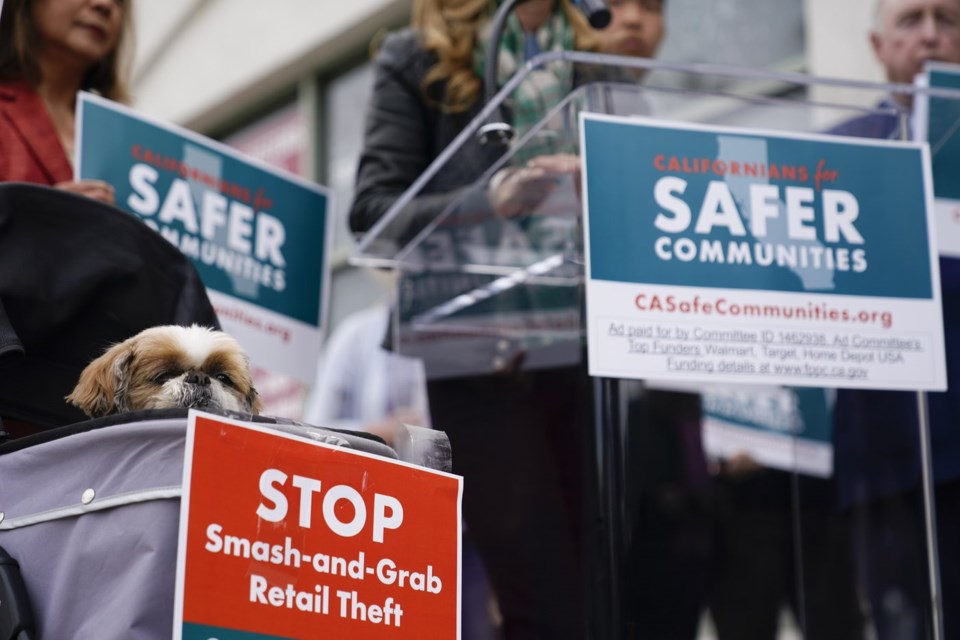SACRAMENTO, Calif. (AP) — Top California Democrats want to advance legislation to crack down on retail theft, announcing they plan to send the measure to voters in November despite a tough-on-crime initiative already backed by retailers and law enforcement.
The lawmakers' plan, led by Gov. Gavin Newsom, seeks to put fewer people behind bars for stealing compared to the other plan. Newsom and lawmakers negotiated the plan behind closed doors over the weekend after failing to convince the coalition of law enforcement and business groups to drop their initiative.
Both proposals would make shoplifting a felony for repeat offenders and increase penalties for fentanyl-related charges. But the lawmakers' plan is narrower in scope.
Under , any prior theft-related convictions, even if they happened years ago, would count toward a three-strike policy for increased sentences. Lawmakers also are proposing harsher punishment for repeat thieves, but the convictions would have to happen within three years of each other.
Prosecutors could aggregate the amount of all stolen goods within three years to charge harsher offenses under the Democrats’ plan.
State Senate President Pro Tem Mike McGuire said Monday it’s “unfortunate” and “frustrating” that lawmakers have to put a crime-focused measure on the ballot. He said the coalition of district attorneys and business groups refused to work with state leaders on a compromise.
“Why are we advancing this measure? Because I’m worried about the draconian measure that’s been advancing by the DAs,” McGuire said at an event. “We need to be able to provide voters with a choice.”
Lawmakers will vote to advance the plan and deliver it to Newsom for his signature before the deadline on Wednesday.
They hope to place the measure as the first item on the ballot in November. With two competing measures on the ballot, the one with more votes would prevail.
Republican lawmakers blasted the Democrats’ plan, calling it “ ” to confuse voters. The coalition of businesses and law enforcement said lawmakers refused to provide them with written proposals, which ended any possibility for negotiation.
“There can be no reason for this other than to stifle any thoughtful debate and jam an inferior measure through the Legislature,” the coalition said in a statement Monday.
The last-minute plan is an attempt by top California Democrats to override another initiative cracking down on shoplifters and drug dealers, which is backed by a broad coalition of businesses, district attorneys and local officials. The coalition and state leaders have retail theft crimes.
District attorneys and business groups want roll back parts of Proposition 47, the progressive ballot measure approved by 60% of state voters in 2014 that reduced certain theft and drug possession offenses to help address overcrowding in jails. In recent years, Proposition 47 has become the focus of critics who say California is too lax on crime.
Their proposal would also make possession of fentanyl a felony, and authorize judges to order those with multiple drug charges to get treatment. Proponents said the initiative is necessary to close legal loopholes in existing laws that has made it challenging to prosecute shoplifting and drug-related charges.
But lawmakers said the retailers’ proposal is too broad. They worry those changes would disproportionately incarcerate low-income people and those with substance use issues rather than target ringleaders who hire large groups of people to steal goods for resale online.
State leaders, including Newsom, had to unravel Proposition 47 or to go back to voters for crime reforms.
Democratic lawmakers were fast-tracking of 13 bills that would and auto thieves and provide funding for drug addiction counselors. State leaders planned to enact the proposals into laws as soon as this month and void the package if voters approve the business groups’ proposal in November. They abandoned that plan Saturday night.
Democrats also are concerned the retailers' tough-on-crime proposal would to the polls in contested U.S. House races that could determine control of Congress.
Crime is shaping up to be the major political issue in California’s November’s election. San Francisco Mayor and Los Angeles District Attorney face tough reelection bids against challengers who have criticized their approaches to crime and punishment.
Trân Nguyễn, The Associated Press




